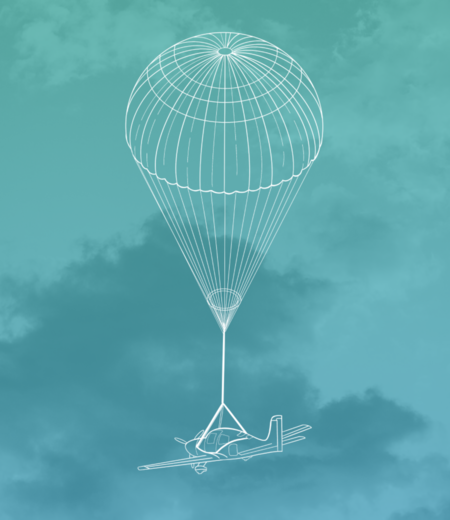It is one of those questions that seem taken from an impromptu talk between friends: “And why don’t they put A giant parachute In the airplanes in case something happens?
The company that achieved it is called Cirrus Aircraft, and for decades it has designed light airplanes for general aviation. His proposal was as simple as revolutionary: incorporating a ballistic parachute directly into the fuselage, as part of the plane design. Not as an accessory, not as optional. Serial. The system is called Caps, acronym of Cirrus Airframe Parachute System, and is present both in the SR series and in the Jet Vision, a turbophane motor plane for five passengers, plus the pilot.
A parachute that is not an accessory, is part of the plane
The operation of the CAPS is as direct as its objective: saving lives when everything else fails. In the upper part of the fuselage, just behind the cabin, a capsule sealed with a large parachute is hidden. If a serious emergency occurs, the pilot only has to pull a t -shaped leverlocated on the roof of the cabin. In a matter of seconds, a small rocket purses the parachute up and it unfolds, braking the fall of the plane until it touches earth.
Of course, there are conditions. The system should not be activated below 600 feet of altitude (about 180 meters above the ground), and its effectiveness is much greater if it unfolds between 600 and 2,000 feet. Above that altitude, the pilot has more margin to evaluate and make decisions, but it is still a valid option if the situation demands it.
The history of the CAPS was not built from one day to another. In the mid -1990s, the Cirrus engineering team, led by Paul Johnston began to work on an idea that, at that time, seemed crazy: adapt a system of Complete parachute to a light plane. They were inspired by a previous prototype developed by BRS (Ballistic Recovery Systems), a company specialized in ballistic parachutes, which had already tried similar solutions for aircraft such as Cessna 150.

A cirrus sr20 displays a parachute in a test
In 1998, Cirrus performed his first test in the southern desert of California. The person in charge of activating the system was a military pilot. That test was key: it showed that the concept worked. From there, Cirrus integrated it as a central part of the design of his first major production model, SR20. Not as an addition, but as a structural element designed from the beginning.
Since its certification, the CAPS system has activated more than a hundred times in emergency situations. According to Cup data, until June 2025 they had Registered 136 deployments. Among them there are stories of people who survived motor failures, control losses or extreme weather conditions.


Graphical representation of CAPS deployment
On its official website, Cirrus states that its system has returned more than 250 people home alive. And some of those stories are especially shocking. Like Greg Huntley, a pilot and owner of a Cirrus aircraft, who suffered an engine failure on October 22, 2014. He activated the CAPS and managed to land with the plane hanging from the parachute. It was unharmed.


Graphic Representation of CAPS IN ACTION
Huntley flew every week for work. He had his base in Charlotte, North Carolina, and although he was never passionate about aviation, he acknowledged that he saved him a long time. On October 22, 2014 he took off like any other day. A few minutes after flight, some 5,000 feet of altitudethe engine stopped dry. “Just before declaring the emergency I thought: I have five minutes of life,” he would remember later.


One of the many airplanes that used the Caps
He made a clear decision: if at 3,000 feet he still did not see the terrain, he would activate the parachute. And so it was. The sky remained completely black through the windshield, so he informed by radio that he was going to display the Caps. “I have taken many children already their parents on their first flights. I always explain that if something happens to me, pull the lever (…) that morning, putting hands on the shooter, I thought: now it is you who is going to check it.” The plane descended and in less than a minute touched land in a grass field.


Caps lever
The culminating point of this philosophy came with the Cirrus Vision Jet, a small monomotor reactor certified in 2016. It was the first Jet of the world equipped as standard with a ballistic parachute for the entire aircraft. But Cirrus went further: Safe Return was added to the CAPS system, a function that allows the plane to land only in case of emergency.


Button ‘safe return’
The idea is simple. If the pilot suffers a sudden disability, any passenger can press a button. At that time, the Jet Vision takes care of everything: Calculate the routecommunicates the situation to the controllers and performs the descent autonomously to land on a safe track. Caps and Safe Return thus form a fairly complete security package.

Cirrus’s parachute system is not designed for all types of aircraft. It does not intend to be. Its effectiveness has to do with the type of plane into which it integrates, with its weight, its structure and the situations for which it was thought. While it is not perfect, it has managed to open a door: demonstrate that there is room to think about security from another angle.
Images | Cirrus | Nasa | CUP
In WorldOfSoftware | They are not fighters, they are planes of the Slovakia government: the day an Airbus A319 and a Fokker 100 stole the show












